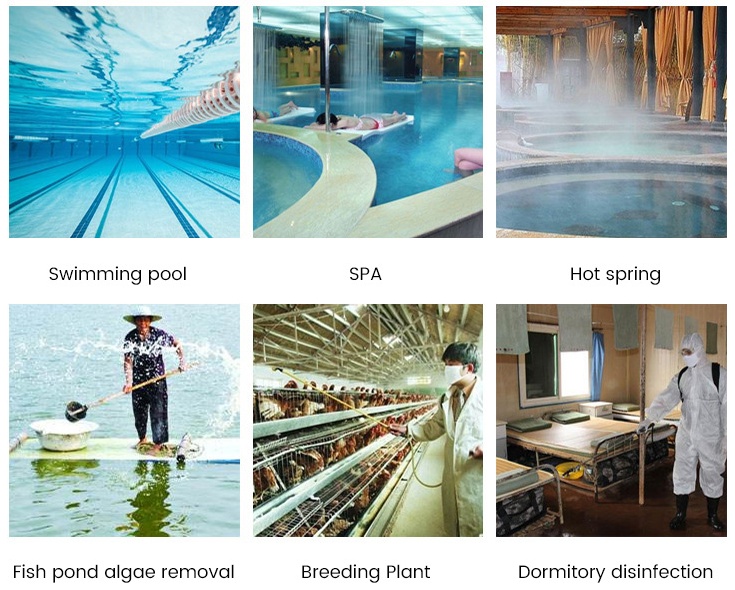Product Name: Trichloroisocyanuric Acid (TCCA)
Alias: TCCA, Trichlor, Trichloroisocyanuric Acid Powder, Swimming Pool Chlorine Granules
CAS No. : 87901
Molecular Formula: C₃Cl₃N₃O₃
Molecular Weight: 232.41 g/mol
Trichloroisocyanuric Acid (TCCA) is a highefficiency, broadspectrum, lowtoxicity disinfectant with an active chlorine content of over 90%. It features strong sustained bactericidal ability, excellent water solubility, and stable storage performance. Widely applied in water treatment, swimming pool disinfection, food processing, medical hygiene, and industrial circulating water systems, TCCA is a trusted solution for global disinfection needs.
◆ Ultra-High Active Chlorine Content (≥90%): Provides 3-5 times higher disinfection efficiency than common chlorine agents, ensuring fast-acting and long-lasting bactericidal effects.
◆ Broad-Spectrum Disinfection: Effectively kills bacteria, viruses, fungi, and algae, with a kill rate of ≥99.99% against E. coli and Staphylococcus aureus.
◆ Environmentally Friendly: Decomposes into harmless CO₂, N₂, and Cl⁻ with no toxic residues, compliant with EU REACH and US EPA environmental standards.
◆ Easy to Use: White crystalline powder/granules with high water solubility, suitable for direct dosing or solution preparation in various applications.

| Application Field | Specific Uses |
| Water Treatment | Disinfection of drinking water (0.1-0.3ppm), sewage sterilization (5-10ppm), and algae control in circulating cooling water. |
| Swimming Pools & SPAs | Efficiently inhibits microbial growth, maintains water turbidity ≤5NTU, and stabilizes pH at 7.2-7.6, replacing traditional liquid chlorine/sodium hypochlorite. |
| Food Processing | Disinfection of equipment and utensils (200-500ppm solution), fruit and vegetable preservation (5-10 minutes immersion), compliant with FDA 21 CFR 178.1010. |
| Medical & Healthcare | Disinfection of hospital sewage and medical devices (100-300ppm immersion), rapidly inactivates pathogens including COVID-19. |
| Industrial Circulating Systems | Suppresses biological slime growth and reduces pipeline corrosion, suitable for central air conditioning and oilfield water injection systems. |
| Item | Index | Test Method |
| Appearance | White powder/granules, free of visible impurities | Visual inspection |
| Active Chlorine Content | ≥90.0% | GB/T 20783-2006 |
| Moisture Content | ≤0.5% | Karl Fischer Method |
| pH (1% Aqueous Solution) | 2.7-3.3 | pH meter |
| Solubility (25℃) | 1.2g/100mL | ASTM D2779 |
| Heavy Metals (as Pb) | ≤10ppm | ICP-MS |
▶ Packaging:
- 25kg/bag (food-grade PE inner bag + moisture-proof kraft paper/woven bag outer layer)
- 1000kg/ton bag (suitable for bulk industrial purchases)
- Customizable neutral packaging or client-specific branding (MOQ ≥10 tons)
▶ Storage: Store in a cool, dry, well-ventilated area, away from fire sources, reducing agents, and organic materials. Shelf life: 2 years (unopened).
▶ Transportation: Class 5.1 oxidizer (UN No. 3086). Shipped in dangerous goods-specific containers with MSDS and IMDG-compliant documentation.
- ISO 9001:2015 (Quality Management System)
- EU REACH Registration (No. 01-2119478723-32-9098)
- FDA Food Contact Notification (FCN No. 1327)
- China Hazardous Chemicals Export License
◆ Certificates: Close-up of REACH/FDA certificates (blur sensitive info, highlight company name and certification numbers).
◆ Packaging Labels: Clear display of product name, CAS No., net weight, and hazard symbols (e.g., "OXIDIZER," "KEEP DRY").
◆ Production Scene: Photos of automated packaging lines and QC staff testing active chlorine content (showcasing strict quality control).
Q: Is TCCA suitable for drinking water disinfection? Are there heavy metal residues?
A: Yes, it complies with WHO drinking water standards (GB 5749-2022). Heavy metals (Pb/As) are ≤10ppm, verified by third-party test reports.
Q: What’s the advantage of TCCA over Sodium Dichloroisocyanurate (DCCA)?
A: TCCA has a higher active chlorine content (90% vs. 60% for DCCA), 30% faster disinfection speed, and stronger stability in hard water across a wider pH range (5.0-9.0).
Q: How is hazardous transportation handled? Will it affect customs clearance?
A: We hold full hazardous chemicals export (certifications), providing complete UN packaging certificates, MSDS, and dangerous goods transport reports to ensure smooth customs clearance (zero-delay cases in Europe, US, and Southeast Asia).